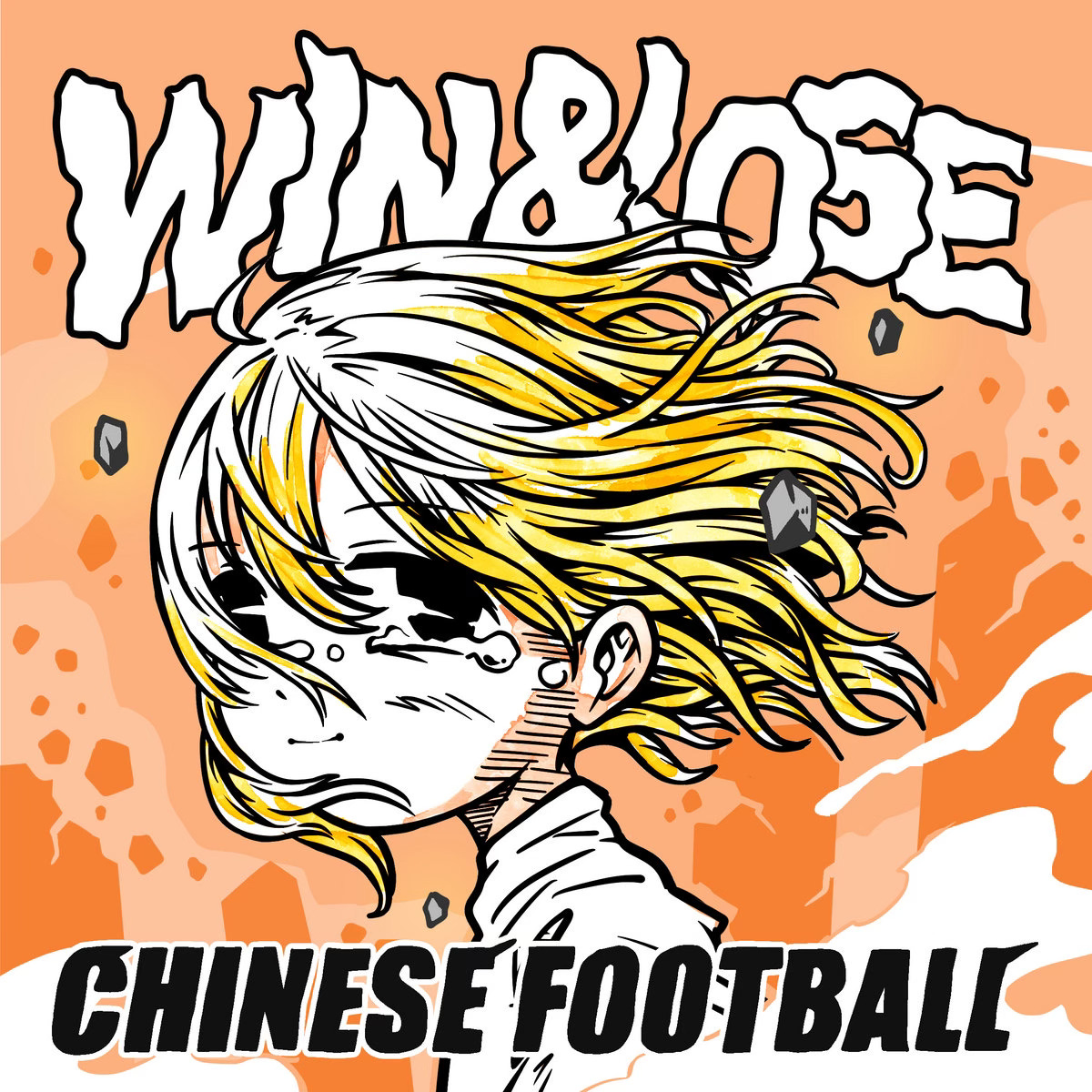BONUS: Win&Lose by Chinese Football [Review]
A bear signal for the Chinese rise
Chinese Football is a post-punk/emo/crying-in-your-car-after-flunking-your-exams band that explicitly riffs on the melancholy, nostalgia, and squirrelly rhythms of the late-90s lightning bolt American Football.
But unlike their inspiration, Chinese Football achieved longevity. And notably for a Chinese band, they found reach outside of China. They just finished a North American tour that looked pretty dope, filling out smallish venues like the 180-person Rockwell in Somerville, Massachusetts. That kind of recognition looks small to an American audience, but as Based Epistolarian Dan Wang notes in his 2023 letter, very little culture escapes Chinese borders. Outside of Three-Body Problem, TikTok (with non-Chinese content), and Genshin Impact, you’re digging in the crates, or else subbing to Concrete Avalanche so that Jake Newby can do that for you.
You don’t need to know Mandarin Chinese to vibe with the rich soundscapes, full-throated harmonies, or flowing poetry of 2022’s Win&Lose. And in my American context, it totally tracks to have an entire genre of music about realizing you’re not eighteen anymore, falling in love, quitting your job, and driving down Route 2 West until you’re deep into the woods of Franklin County.
But in the Chinese context…that feels weirder.
Struggle and Modernization 斗争与现代化
Recently, Lizzie C. Lee provided a run-down of a Xi Jinping speech published on 31 December 2024 in Qiushi 求是. The speech rests on a very Chinese challenge: how to advance “modernization” 现代化. Whereas American commentators see the Chinese Communist Party’s embrace of market mechanisms as a contradiction or rejection of, uh, Communism, the CCP does not see such a contradiction. Yes, Xi has beef with private capital, which he’ll occasionally act on, but he sees market functions as a necessary piece of modernizing the economy, of producing steel, cars, industrial agriculture, wealth. But Xi doesn’t think markets will solve every problem: he contrasts Chinese modernization against the American path towards inequality, division, and slash-and-burn tactics on the spirit.1 He thinks the Chinese approach, lead by the Communist Party, has more soul to it—and he cares deeply about that soul.
Of course, the work is not yet done, and the path forward remains difficult. Xi still knows this, and he expects people to keep hustling: bold thinking, decisive action, solving the small problems before they metastasize into big problems. In particular, he harps on the value of struggle 斗争, of letting young talent “learn to swim by swimming” 在游泳中学会游泳. From a thirty-thousand foot view, this sounds like stuff the DOGE camp or This Part of Twitter (TPOT) would say about building a “high agency mindset” because “you can just do things.” But Lee argues that the speech has a hint of paranoia to it. Xi isn’t saying all this to inspire fresh-faced young cadres; he’s seeing people slack off or lose faith in the party, and he wants to smack some energy back into them.
Moly at Chinese Doom Scroll offers a dark mirror to this facet of Xi Jinping Thought:
It might be a little unbelievable to you, that a country can just sacrifice half its population to stabilise the other half. But I’ll remind you that sacrificing half the population to boost the other half is literally the entire strategy that China is built on…China is competitive on the international stage precisely because it is willing to look the other way while you make a sweat shop of people work unpaid overtime 80 hours a week while you pay them a quarter of minimum wage and don’t give health insurance or retirement benefits…And China needs to compete. [Emphasis mine]
Regardless, the message gets across:
Quit crying, and get grinding. The nation will burn if you fail.
Win&Lose: Take Me Away, This World’s Too Wild
But the lyrics of Win&Lose—at least, the Deepseek V3 translations thereof—suggest more crying than grinding. The lyrics sit on a nervous exhaustion, of feeling like the world is too much, of wanting the solace of nature, or at least of longing for home.
The flowers never lie,
They bloom every spring,
Bright as ever, only to be buried in the soil.
Fighting back, still ending up bruised and broken.
“Take me away, this world’s too wild.”
The warm summer night breeze starts to make me dream.
- “Summer Limited Girlfriend”
“Human Lost” makes this vibe most explicit, asking if everyone’s phones went dead, if all the lights turned off, whether things would better with only the snow and the flowers. But it’s not all pessimism. There’s respite in one’s imagination, in the passing of the seasons, and—just maybe—in escape.
Time won’t lock itself away,
The grandeur of the rivers and lakes remains.
Time won’t forget,
Setting sail again, heavy with the weight of the waters.
- “Wuhan”
The Long Vacation of an Epicurean Culture
In mid-2024, the phrase “garbage time of history” 历史的垃圾时间 caught fire in China as a phrase for the vibes of the youth. It’s since been censored—though not yet memory-holed—but the original article had more to say than its original meme. The article is on Weibo, but I ripped a Claude translation for a brief scan: EDIT 2025-04-16: The Weibo article has been taken down, but Hu himself provided an English translation here:
Briefly, “garbage time” is the point near the end of a sports game—typically basketball—at which the game has already been decided, but the teams are simply running out the clock. The losing team may break out second- or third-string players, try risky plays, or at least pantomime competing to save face. Writer Hu Wenhui 胡文辉 compares the current stage of the Sino-American competition with the Brezhnev-and-beyond era of Soviet-American competition, which Mikhail Gorbachev himself later described as an “Era of Stagnation” Эпоха застоя. In Hu’s account:
The overall situation is decided, the losing side is hard to reverse, and no matter how hard they try, it’s all a futile struggle. They can only seek to go out as gracefully as possible.
Hu notes that garbage time can last a long while—even centuries. But a long decline is still a decline. He offers the Confucius quote “When the Way does not prevail, hide” 无道则隐 and suggests that the contemporary meme of “lying flat” 躺平 reflects this sentiment. Even if you’re getting smacked by the 2024 Misery Grand Slam, you can replicate the vibe of the Japanese TV series Long Vacation and just…chill. Go on a roadtrip. Write poetry. Have a summer-limited girlfriend. Rùn 润 to Chiang Mai and try ayahuasca, get obsessed with a celebrity’s “widow vibes” 寡妇感, or least spend your money on emotional value 情绪价值 instead of that house you’ll never actually afford.

Xu Jilin 许纪霖, a prominent historian at East China Normal University, thinks the youth have already clocked out. In an interview given to Tencent Research Institute (and translated by Thomas des Garets Geddes for Sinification), Xu describes the post-90s 90后 and post-00s 00后 generations as Epicureans and Cynics, devoid of the polis and “red culture” 红色文化 that drove older cohorts to work through the ‘80s out of a self-abnegating idealism for the modernizing China, to grind and invest in the name of “poetry and distant horizons” 诗与远方, to take global politics seriously even in old age.
Instead, the youth are focusing on themselves, on their own emotions, on a “worldliness” 世俗主义 separate from the spiritual power that Communism could offer. Xu doesn’t really blame them. His generation2 rode China’s reform and opening up to great personal wealth, but the Chinese youth—people my age—missed out on the gravy train and instead found themselves weighed down with the externalities of that growth: industrial “overcapacity” 产能严重过剩, staggering unemployment in the knowledge-work jobs they studied for, and a truly grim future for the young women.
In Xu’s words:
It is as though a great ship were about to sink. Those onboard have dived into the sea, each person grabbing a lifebuoy for himself and swimming off on his own. 就像大船要沉没了. 自身找条救生圈,各奔前程.
The translator Geddes is careful to note that quantitative data for these generational differences is scarce. Xu is likely making his analysis on vibes, even if he’s well tuned in.
But those vibes are rough, man.
Win&Lose: In the End, We’re All Losers
Win&Lose has an eschatological undertone to its melancholy. It’s not just that the world is too much, but also that the world is breaking. The album pivots around the twin refrains of:
You expect to win
And:
In the end, we’re all losers
Going back to American Football’s eponymous 1999 album, the vibes are similar: again, crying in your car after flunking your exams, or maybe after your first heartbreak, or maybe after realizing your second heartbreak just won’t hit the same. But American Football weren’t thinking about the end of the world.
Watching the world split in two,
The old era crumbles faster and faster.
How many well-meaning cries have been misunderstood by time?
Watching the world split in two,
The new age hasn’t arrived yet.
How many silent landscapes have been buried by the tide?
- “The World is Splitting in Two”
The eulogistic thread peaks with the song “Dinosaurs Went Extinct in the End,” which crescendoes with the chant:
Be better, be faster, be louder, be brighter,
Be higher, be bigger, be more, be stronger.
Maybe that voice is simply a familial expectation. I know my parents asked the same for me. But on 31 December 2024, Qiushi posted a February 2023 speech by General Secretary Xi Jinping in which the Paramount Leader himself demands cadres “see risks early, act quickly, [and] make decisive calls” 见事早、行动快,当断则断、当机立断, and I can’t help but hear this very song reply:
Worship him, fear him,
Defeat her, want to become—
Will become who?
Who?
I have never stepped foot in China. It might be some time before I even try. I cannot claim that this one band whose singer writes “I have begun to accept myself as a loser” because Chinese Football “failed to be famous” is representative of the “Gen Z Group” warranting so much spilled ink. But I listen to the music, and I think about cultural long vacations and emotional value.3 I think about DOGE and the giddy chaos of the New Right Poast. I ask myself if anyone in the United States, even the most morose climate doomers, would ever post “let it rot,” 摆烂 much less find that line go viral.
Maybe this is just my filter bubble. I, too, am making my analysis on vibes. Thousands of young Chinese surely have that “passion and curiosity” 热爱和好奇心, that hot love for advancing the future, the same passion and curiosity that let me burn an entire Saturday writing this music review instead doing of my grad school homework.
But when I spin up Chinese Football’s “Electronic Girl” or Howie Lee’s “Dry Prayers No Echoes” or Capper’s “Burn Slow,”4 I can’t see China taking Taiwan.
I can’t see China win, because Chinese my age can’t, either. They feel they have already lost.
They’re just running out the clock.
You can read the lyrics for yourself here:
I’d argue Xi got this idea from his longtime friend and resident grey eminence Wang Huning—back in the ‘80s, Wang wrote a book called American Against America that amounted to Wang taking notes on how the United States achieved its industrial output and wealth, with the goal of reverse-engineering—but not fully replicating—the American model of modernization.
Xu was born in 1957.
I swear, however bad you think the gender wars are in the United States, it has to be worse in China:
“Work harder, not just for RMB
The best achievement, an all-black Maserati
No tik-tock sound, Rolex, Macallan bottle cap
Opened, the lock of life, starting an Oscar movie-like brilliance”




